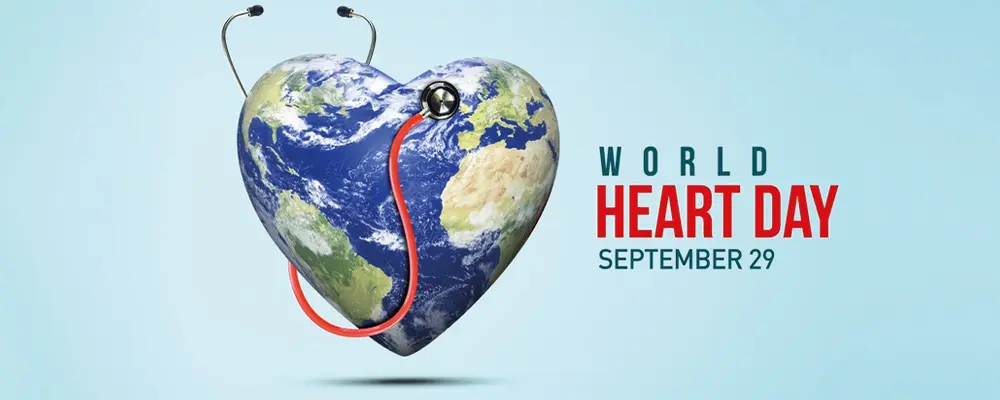Overview
The human heart, an astonishing organ, is a symbol of life, love, and vitality. It is also a vital pump that propels blood throughout our bodies, supplying the oxygen and nutrients necessary for survival. Given its pivotal role, it’s no surprise that maintaining a healthy heart is essential for a long and fulfilling life.
World Heart Day is a globally recognized observance that raises
cardiovascular health awareness and promotes preventative measures that reduce the risk of heart diseases. Celebrated on September 29th each year, this day serves as an important reminder for individuals, communities, and governments worldwide to prioritize heart health.
In this blog, we will delve into the significance of World Heart Day, the increasing significance of cardiovascular health, strategies to keep your heart healthy, and the incredible breakthroughs that have been achieved in the field of cardiovascular research, contributing to the betterment of heart health worldwide.
Understanding the Significance of World Heart Day
The
World Heart Federation (WHF) established World Heart Day as an international campaign to raise awareness about cardiovascular diseases (CVDs) and promote heart-healthy living. It is a day to bring together individuals, healthcare professionals, and governments to address the growing global burden of heart disease. World Heart Day emphasizes the following key messages:
- Prevention: The significance of preventive measures in reducing the risk of heart diseases.
- Awareness: Raising consciousness about heart health and the warning signs of CVDs.
- Early Detection: Encouraging regular health check-ups to detect heart-related issues at an early stage.
- Lifestyle Changes: Promoting a heart-healthy lifestyle through dietary changes, exercise, and stress management.
- Access to Care: Ensuring that everyone has equal access to healthcare and treatment.
Cardiovascular Diseases:
A Leading Cause of Death
Cardiovascular diseases are a group of disorders that affect the heart and blood vessels, including conditions like heart disease, stroke, and hypertension. These diseases collectively constitute the
major cause of death worldwide, accounting for nearly 18 million deaths annually. World Heart Day highlights the following alarming statistics:
- High Mortality: Cardiovascular diseases account for approximately 31% of all global deaths.
- Growing Prevalence: Heart disease affects people of all ages, and the number of cases in younger populations is increasing.
- Economic Impact: CVDs have a massive economic impact, placing a strain on healthcare systems and economies.
Taking Control of Your Heart Health
The good news is that many risk factors for cardiovascular diseases can be controlled or reduced by making lifestyle adjustments and receiving proper medical care. Here are some practical steps you can take to prioritize your heart health on World Heart Day and throughout the year:
- Healthy Diet: Incorporating a diet that includes fruits, vegetables, whole grains, lean proteins, and healthy fats. Reducing the intake of processed meals, sugary beverages, and excessive salt.
- Regular Exercise: Aim for at least 150 minutes per week of moderate-intensity aerobic activity or 75 minutes per week of vigorous-intensity exercise. Strength exercises should be included for muscle health.
- Tobacco Cessation: If you are a smoker, get help to quit. Quitting smoking lowers the risk of heart disease considerably.
Reduce Alcohol Consumption: drink alcohol in moderation. Adhere to recommended guidelines for safe alcohol usage.
- Manage Stress: To cope with everyday challenges, use stress-reduction strategies such as meditation, yoga, or mindfulness.
- Regular Check-ups: Schedule regular health check-ups to evaluate blood pressure, cholesterol levels, and overall cardiovascular health.
- Recognize the Warning signs: Learn to recognize the warning indications of heart disease, such as chest pain, shortness of breath, and irregular heartbeats. Look for immediate medical attention with a cardiologist near you if you experience these symptoms.
- Medication Compliance: If prescribed medication for conditions like high blood pressure or high cholesterol, it is essential to take it as directed by a healthcare provider.
Breakthroughs in Cardiovascular Research
The fight against cardiovascular diseases has been significantly improved by groundbreaking research and innovation. Over the years, researchers and scientists have made significant advancements in comprehending the complexity of the cardiovascular system and creating innovative techniques to prevent and treat heart disease. Here are some of the notable breakthroughs in cardiovascular research:
- Statins and Cholesterol Management: The introduction of statin drugs has transformed the treatment of elevated cholesterol levels. Statins are extremely successful at lowering LDL (bad) cholesterol, which is a key risk factor for heart disease.
- Minimally Invasive Procedures: Techniques such as angioplasty and stent implantation have changed the way coronary artery disease is treated. These treatments are less intrusive than standard open-heart surgery and have improved patient outcomes significantly.
- Advances in Cardiac Imaging: New imaging technologies, such as MRI and CT scans, provide detailed images of the heart and blood arteries, allowing for more accurate diagnosis and treatment planning.
- Genetic Research: Genetic research has offered important insights into the hereditary variables that lead to heart disease. This knowledge helps identify individuals at higher risk and informs personalized treatment options.
- Stem Cell Therapy: Researchers are exploring the use of stem cells to repair damaged heart tissue and improve cardiac function after heart attacks. This innovative approach holds great promise for the treatment of cardiac disease in the future.
- Telemedicine and Remote Monitoring: Advances in telemedicine and wearable health technology enable remote monitoring of heart patients, allowing timely intervention and reducing the risk of complications.
- Precision Medicine: Tailoring treatments to an individual’s unique genetic makeup and health characteristics is a growing trend in cardiovascular care, boosting the efficacy of medications.
- Preventive Interventions: Research has underlined the need for early intervention and prevention, leading to extensive campaigns urging lifestyle changes and regular check-ups to minimize the risk of heart disease.
Community Involvement
World Heart Day is not just about individual well-being but also about creating heart-healthy communities. Communities have a significant role in shaping the environment and opportunities that influence heart health. Here are ways in which communities can contribute:
- Education and Awareness: Organize workshops, seminars, and public awareness campaigns to educate community members about heart health.
- Healthcare Access: Advocate for increased and improved access to healthcare services, particularly in marginalized areas.
- Workplace Wellness: Encourage employers to develop wellness programs that promote physical activity, good diet, and stress reduction.
- Promote Heart-Healthy Environments: Creating environments that promote heart health is crucial. This can include initiatives to make cities more walkable, encourage physical activity, and reduce air pollution, all of which contribute to overall cardiovascular wellness.
Role of Healthcare Systems
Healthcare systems have a significant impact on the landscape of cardiovascular health. Healthcare leaders should take the following measures on World Heart Day:
- Preventive Measures: Invest in preventive healthcare programs that promote heart-healthy behaviors from a young age.
- Healthcare Access: Ensure that all citizens have access to quality healthcare, including cardiovascular screenings and treatments.
- Tobacco Control: Adopt and implement measures that discourage tobacco use, such as increasing cigarette taxes and smoke-free public locations.
- Support Research: World Heart Day also supports research efforts aimed at better understanding the causes and treatments of cardiovascular diseases. Research is essential for developing more effective prevention and treatment strategies.
A Note from Revival
The field of cardiovascular research has witnessed remarkable advances that have paved the path for novel treatments, early diagnosis, and personalized care. As we celebrate World Heart Day and reflect on the progress made, let us renew our commitment to heart health. By embracing the lessons learned from research and applying them to our lives, we can look forward to a future where heart diseases are less prevalent, and the human heart can continue to beat strongly for generations to come.
Revival Research Institute encourages individuals of all ages to join in heart-healthy activities and participate in cardiology clinical trials to minimize the global burden of heart disease and advance cardiology research.
Takeaway
World Heart Day is a call to action to prioritize our cardiovascular well-being, both individually and collectively. It serves as a reminder that our hearts deserve our attention, care, and dedication. By understanding the significance of this day, recognizing the risk factors for cardiovascular diseases, and taking proactive steps to maintain a healthy heart, we can reduce the global burden of heart diseases and live longer healthier lives. Let us celebrate World Heart Day as a commitment to a heart-healthy future for all.




